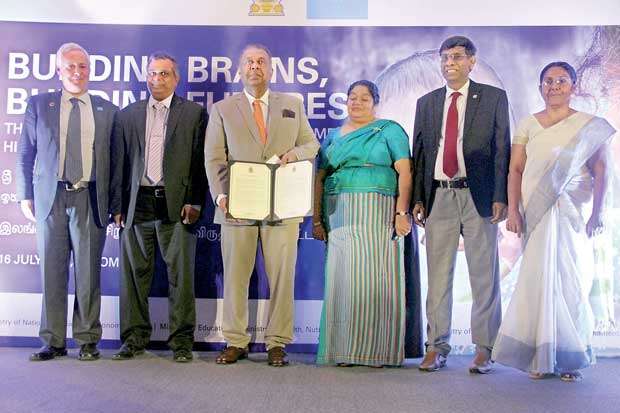Reply To:
Name - Reply Comment
Last Updated : 2024-04-27 00:40:00

 their full brain capacity. This is the concept highlighted through the ‘Eat, Play, Love’ campaign launched by the United Nations Children’s Fund (UNICEF). ECD is identified as one of the most effective and proven drivers of economic growth. In view of National Early Childhood Care Week 2018, UNICEF Sri Lanka organised a high-level meeting under the theme ‘Building Brains, Building Futures’. This meeting brought together leading experts in child development and also presented three early childhood-centric budget proposals to Mass Media and Finance Minister Mangala Samaraweera to be included in the National Budget 2019.
their full brain capacity. This is the concept highlighted through the ‘Eat, Play, Love’ campaign launched by the United Nations Children’s Fund (UNICEF). ECD is identified as one of the most effective and proven drivers of economic growth. In view of National Early Childhood Care Week 2018, UNICEF Sri Lanka organised a high-level meeting under the theme ‘Building Brains, Building Futures’. This meeting brought together leading experts in child development and also presented three early childhood-centric budget proposals to Mass Media and Finance Minister Mangala Samaraweera to be included in the National Budget 2019. - Jean Gough
In her remarks, UNICEF Regional Director for South Asia Jean Gough said that loving, playing with children and eating are the ingredients that the child needs in their early years of life. “If a child is not loved, not provided with the right food and play is not simulated during these early years, the investments we do later on are totally lost. So this is the age to invest because the personality of a child is formed and it’s very simple. This is what early childhood means for us. As the South Asian Regional Director my job is to compare and contrast some countries in the region that have prepared to respond to the economic and social changes that they have gone through. Today is a combination of three years of activity that has taken place under the leadership of the government and investing in early years will be a key in driving Sri Lanka towards sustainable development. These activities started in November 2016 when the Minister of Child Affairs and the State Minister of Finance attended the Brilliant Brains Asia Pacific high-level meeting in Malaysia. Through this we started to focus more on the brain development of the child. During this meeting, leaders shared learning with counterparts across the wider region and focused on children on three areas; social protection, ending violence against children and providing universal healthcare. In March 2017, the members of the Parliamentary Caucus for Children and the Sectoral Oversight Committee for Women and Gender met their counterparts in South Asia again and upon their return they agreed to conduct the Parliamentary Forum on early childhood development later that year.”
She further said that this meeting took place in November last year under the leadership of the Speaker Karu Jayasuriya and presented new compelling medical and economic research into the impact of ECD on economic and social development. “Hence it showed how critical these investments are. Most recently, several cross-sectorial workshops led by the Department of National Planning of the Ministry of National Policies and Economic Affairs resulted in a budget proposal which will be presented to the Mass Media and Finance Minister during this high-level meeting. Sri Lanka is a trailblazer in terms of human capital investment in South Asian region. This position is because of the enlightened and consistent health and education policies implemented by the governments over a number of years. When comparing to other countries in South Asia, Sri Lanka has developed in these areas and needs to compare itself with the wider South Asian region. This is because as Sri Lanka becomes a knowledge-based economy, its growth will be driven by the innovation of its workforce who will produce knowledge-based products and services. The market for these products and services and trading partners will likely be the fast-growing economies in the Asia Pacific region including Singapore, Thailand, Malaysia and Vietnam. Unless Sri Lanka invests in its future workforce to enable innovation and increase productivity to meet the needs of the future, it will not be able to transform its economy. This will result in a struggle to compete with existing knowledge-based economies within the region. ”
-Mangala Samaraweera

Minister of Mass Media and Finance Mangala Samaraweera said that after studying these proposals they will be included in the Budget speech which will be presented in November. “In fact as you know, a fundamental principal of this government’s economic development policy is the economic empowerment of Sri Lanka’s citizens. We want to create an economy where citizens are able to take their economic destiny into their own hands, without relying on the state from the cradle to the grave. This entails the development of entrepreneurship and small development which is supported by our recently launched ‘Enterprise Sri Lanka’ vision.”
He said much more needs to be done to keep up with global education standards. “One such important area of focus is the question of early childhood development. ECD is of great importance to Sri Lanka as it has potential to improve school learning outcomes which can have long-lasting effects on the well-being of the population. As Sri Lanka positions itself as a highly knowledge-based economy, robust, cognitive development from an early stage becomes essential. Preparing children from a young age ECD enhances their school readiness; children increase their retention rates and achieve better results in standardized tests, leading to a reduction in school dropout rates. ”
One such important area of focus is the question of early childhood development. ECD is of great importance to Sri Lanka as it has potential to improve school learning outcomes which can have long-lasting effects on the well-being of the population
“Studies across the world have shown that on average, children who participate in ECD programmes attain higher grades than their peers,”the Minister continued. “Additionally benefits of ECD go beyond economic growth as it can help fight income inequality and create better human beings. By levelling the playing field for children that come from diverse cultural and economic backgrounds, it takes the role of an equalizing mechanism across society. Investment in ECD also helps the government in providing a social endowment to future generations that help reduce income disparities in society. Given the huge benefits that improving learning outcomes can have on promoting human development and boosting economic growth, the government is committed to increase investments in enhancing quality of education.”
- Prof. Melhuish
Speaking on the topic of Early Experience, Long-term Development and the Wealth of Nations, Professor of Human Development at the University of Oxford Edward Melhuish said across Organisation and Economic Co-operation and Development (OECD) countries, 20% of people do not achieve basic minimum skills for adequate performance in normal societies. This problem is twice as great for disadvantaged groups. If we look at the jobs that the children born today will be doing when they are adults, 70% of those jobs don’t exist. I don’t know what those jobs but they will be highly skilled jobs. For example, thirty years ago, the job of a web designer didn’t exist and this will be happening all the time. Therefore children of today, need to be highly skilled when they are adults so that they could adapt and adjust to changes in society. Therefore they require cognitive and non-cognitive skills and how these skills could be improved.”
There are three strands of research that structure the importance of early years in developing these skills. Neuroscience shows the importance of early brain development, while Developmental Science shows that high quality Early Childhood Education – improves children’s life chances. Economics show that high quality ECE can save society significant amounts of money over time. Early childhood therefore contributes to creating the kinds of work forces needed in the 21st century. In terms of neuroscience, everything we do, feel or say reflects the functioning of our brains. By birth, there are 100 billion neurons and with brain development, synapses increase. Synapses are the junctions between neurons. They form at the rate of 700 per second in the early years. 60% of the nutrition a child receives in the first year of life goes towards brain development. By age three, 80% of synaptic connections are made and then there is this process of pruning synapses. This is not reinforced by experience and therefore you either use it or lose it. What we see is that synapse development influence brain plasticity which is the ability of the brain to adapt to experience and it declines with age. As such brain development depends on nutrition, health and experience.”
In his presentation he also showed how synapses are formed in abundance by age two which eventually reduce in number by age six. Some highlights include how early childhood education is important for language development where language development begins at birth. Hence a child with poor language at three years will be at risk and it is important that the proper interventions take place. When looking at the rate of Return on Investments, this is usually high during pre-school years and gradually decreases during the post-school period. From the age of two, all children benefit from pre-school, the quality of which matters a lot. A high quality pre-school can protect a child from effects of a less effective school. As such when brain malleability decreases, government spending tends to drastically increase. He also showed how mother’s education impacts literacy and numeracy rates of 16-year-olds. In his concluding remarks, Prof. Melhuish said that important aspects of quality ECE are stimulating interactions with children and effective curricula. “In Sri Lanka, health services have improved for maternal care, growth monitoring, nutrition, immunisation and sanitation. However nutrition indicators have remained stagnant recently and there is still much stunted growth. ECE can boost child outcomes for the whole population and child protection needs improvement where children should have access to universal services. Sri Lanka faces a shortage of human resources and lags behind other middle income countries in terms of ECE since Sri Lanka spends an extraordinarily little amount on ECE. This is as low as 0.0001 per cent of the GDP lower than its South Asian neighbours and even lower than poor Sub-Saharan African countries. Consequently, ECE programmes in Sri Lanka are inadequate. Three observations are that accessibility is low, quality is low and governance is poor. But by enhancing access to ECE programmes especially for poor households, improving the quality of ECD programmes and improving sector coordination and governance, these targets could be achieved.”
Pics by Pradeep Dilrukshana

Add comment
Comments will be edited (grammar, spelling and slang) and authorized at the discretion of Daily Mirror online. The website also has the right not to publish selected comments.
Reply To:
Name - Reply Comment
US authorities are currently reviewing the manifest of every cargo aboard MV
On March 26, a couple arriving from Thailand was arrested with 88 live animal
According to villagers from Naula-Moragolla out of 105 families 80 can afford
Is the situation in Sri Lanka so grim that locals harbour hope that they coul